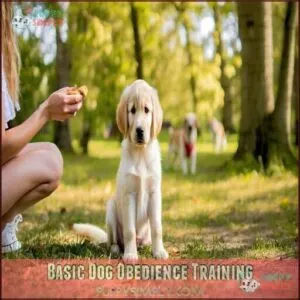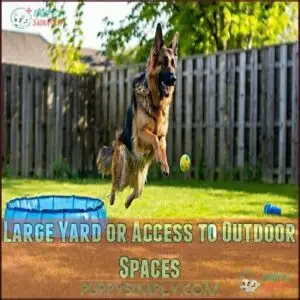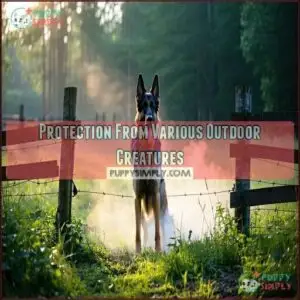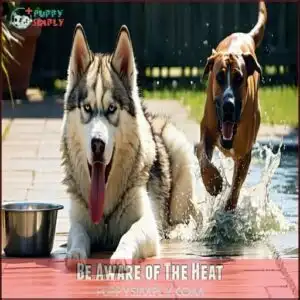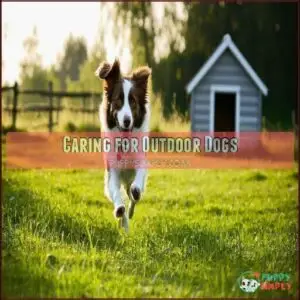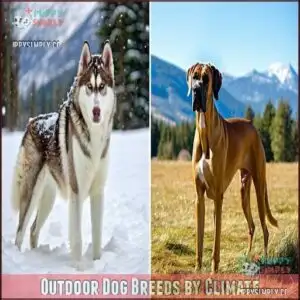This site is supported by our readers. We may earn a commission, at no cost to you, if you purchase through links.

Labrador Retrievers, known for their friendly nature, also love exploring and make great companions for outdoor activities. German Shepherds, with their loyal and hardworking temperament, are another solid choice.
These breeds enjoy space to roam, but they’ll still need proper shelter, care, and plenty of interaction with you. After all, even the toughest dogs love a good belly rub. Want more tips on keeping them safe and healthy?
Table Of Contents
- Key Takeaways
- Best Outdoor Dog Breeds
- Characteristics of Outdoor Dogs
- Outdoor Dog Safety Tips
- Caring for Outdoor Dogs
- Outdoor Dog Breeds by Climate
- Frequently Asked Questions (FAQs)
- What are the best outdoor dog breeds?
- How can I keep my dog safe while outdoors?
- What are the characteristics of an outdoor dog?
- Are outdoor dog breeds good for outdoor activities?
- How do I choose the best outdoor dog breed?
- What makes a good outdoor dog?
- Can outdoor dog breeds live outside?
- Are mixed breeds good for outdoor dogs?
- What is the best dog for outside?
- What breed of dog can be kept outside?
- Conclusion
Key Takeaways
- Match the dog’s coat and energy level to your local climate to ensure they thrive in outdoor conditions.
- Provide proper shelter, water, and protection against weather extremes, parasites, and toxic threats.
- Outdoor dogs need daily exercise, mental stimulation, and regular training to stay happy and healthy.
- Companionship is critical—spend quality time with your dog to strengthen your bond and prevent isolation.
Best Outdoor Dog Breeds
You’ll find that certain dog breeds are naturally built for outdoor living, with weather-resistant coats and high energy levels that make them perfect companions for active lifestyles.
From the hard-working Alaskan Malamute to the versatile Labrador Retriever, these outdoor-loving breeds thrive when they’ve space to run, jobs to do, and plenty of fresh air to enjoy, making them ideal for active lifestyles.
Alaskan Malamute
Anyone looking for a powerful outdoor companion will find the Alaskan Malamute hard to beat.
These majestic sled dogs thrive in cold climates with their thick double coats requiring regular grooming.
Your Malamute will need extensive daily exercise to match their high energy levels.
Built for adventure, Alaskan Malamutes thrive on extensive daily exercise to channel their high energy and adventurous spirit.
Despite their imposing size, they’re known for friendly temperaments, though their independent nature requires consistent training.
They’re built for outdoor activities and winter adventures.
Australian Shepherd
Australian Shepherds are superb outdoor companions with boundless energy and remarkable herding instincts.
They’ll run circles around you while hiking or running trails.
These active dog breeds need consistent training and regular coat maintenance to keep their medium-length fur tangle-free.
Your Aussie’s socialization skills will flourish outdoors, but they need plenty of mental challenges too, making them perfect for active owners who enjoy spending hours outside every day with boundless energy and requiring regular coat maintenance.
Labrador Retriever
Unlike their herding cousins, Labrador Retrievers are born water lovers and excel as outdoor companions.
Labrador Retrievers thrive outdoors with boundless energy, intelligence, and a love for water—perfect companions for active families in any adventure.
These friendly canines combine intelligence with boundless energy, making them one of the best outdoor dogs for active families.
Labrador Retriever owners appreciate these four standout traits:
- Exceptional swimming abilities
- Weather-resistant double coat
- Trainable, willing-to-please temperament
- Versatile outdoor skills (hiking, running, retrieving)
Their low-maintenance grooming needs and adaptable nature make Labs perfect outdoor partners in almost any climate.
Siberian Husky
Deep down amidst Siberian Husky territory, you’ll find a breed that lives for outdoor adventure.
Their striking blue eyes and wolf-like appearance match their incredible endurance and cold-weather adaptability.
| Husky Traits | Cold Weather | Warm Weather |
|---|---|---|
| Energy Levels | Extremely High | High (needs shade) |
| Training Needs | Consistent & Firm | Same approach |
| Socialization | Pack-oriented | Loves company |
These dogs excel at running, hiking, and sledding—just don’t expect them to guard your home!
German Shepherd
German Shepherd’s versatility makes them one of the best outdoor dogs for active families.
They excel as guard dogs while maintaining a loyal, protective temperament. Your Shepherd will need daily exercise and consistent training to thrive.
These intelligent breeds love hiking, running, and working jobs that challenge their minds. Despite their tough appearance, they require regular health checks to prevent common breed-specific issues.
Bred initially for herding, they exhibit high intelligence and trainability, which showcases their high intelligence and ability to adapt to various tasks, making them a great companion for active families.
Characteristics of Outdoor Dogs
You’ll find that outdoor dogs share key traits like weather-resistant coats, high energy levels, and independent yet trainable personalities.
They’ll need plenty of space to run, regular exercise, and proper training to thrive while still enjoying your companionship at the end of their adventures.
Coats Fit The Climate
A dog’s coat is its natural defense against the elements.
You’ll want to match coat types to your climate—thick double coats for cold weather breeds like Malamutes, while shorter coats suit warm weather breeds like Vizslas.
Consider shedding frequency and grooming needs too.
Some climate-adapted breeds require weekly brushing, while others need professional grooming.
Remember, even hypoallergenic breeds need sun protection during summer adventures.
Active, High-Energy Breeds
The outdoorsy breeds that thrive in nature are natural athletes with boundless energy to burn.
You’ll need to provide plenty of exercise for these active companions, or they’ll find their own mischief.
Most high-energy dog breeds need 1-2 hours of daily activity, from hiking to agility training.
Their nutritional needs match their energy output, requiring quality protein to fuel their adventures.
Plenty of Human Interaction
While outdoor dog breeds enjoy nature’s playground, they still crave your attention and companionship.
Even the most independent dog breeds need regular human interaction to thrive.
- Daily bonding activities strengthen your relationship
- Family integration prevents isolation and behavioral issues
- Socialization needs include playtime with other dogs
- Training benefits multiply with consistent human guidance
- Dog companionship works both ways—they’re happiest as part of your pack
Basic Dog Obedience Training
Training your outdoor companion goes beyond basic commands.
Leash manners and recall training are essential for safe adventures together. Teach a reliable sit-stay to keep your dog out of trouble while exploring.
Positive reinforcement works wonders during dog obedience training—treats and praise reinforce good behavior.
Don’t skip socialization skills; your outdoor dog needs to respond appropriately to wildlife, strangers, and other pets they’ll encounter in natural settings, using positive reinforcement.
Large Yard or Access to Outdoor Spaces
Beyond training, your outdoor companion needs space to roam and burn energy.
Yard size matters – larger breeds like German Shepherds need more room than smaller active dogs.
If you don’t have sprawling acreage, no worries! Regular access to parks, trails, or dog-friendly beaches works too.
Just verify your property has secure fencing considerations adapted to your breed’s exercise needs and outdoor enrichment requirements, including secure fencing to ensure your dog’s safety.
Outdoor Dog Safety Tips
You’ll need to protect your outdoor dog from weather extremes, parasites, and toxic plants just as you’d guard your own child from harm.
Whether you’ve got a hardy Husky or a rugged Retriever, knowing these safety tips can mean the difference between a happy, healthy pet and an emergency vet visit.
Weather Conditions
Your dog’s safety starts with understanding weather challenges. Seasonal adjustments are vital when keeping your canine companion outdoors.
For effective climate adaptation, follow these key practices:
- Provide deep shade and extra water during high temperatures
- Inspect adequate insulated shelter during cold spells
- Monitor breed adaptability – coat thickness substantially affects whether your pup thrives in extreme weather
Always bring dogs inside during severe weather events. Consider a dog cooling vest during hot weather.
Protection From Various Outdoor Creatures
While keeping your furry friend safe from the elements, you’ll also need to guard against wildlife encounters.
Even protective dog breeds need help staying safe from outdoor threats.
| Threat Type | Protection Method | Best For |
|---|---|---|
| Predators | Predator urine | Creating "pee-rimeters" |
| Small Pests | Fabric softener sheets | Food odor disguise |
| Raccoons | Granular repellents | Trash protection |
| Bears | Bear spray | Emergency defense |
Always supervise your pets outdoors to prevent venomous bites and insect stings.
Recognizing the signs of heatstroke in dogs is essential during warmer months.
For complete dog protection, combine repellents with secure fencing to keep wildlife out and your four-legged friend safe.
Poison Dangers
While protecting your dogs from wildlife, don’t forget nature’s silent threats. Your yard might be full of toxic plants like azaleas, lilies, and tulips that can harm your outdoor dog.
Watch for pesticides, rodenticides, and antifreeze too – they’re deadly to curious pups. Even mushrooms and cocoa mulch can cause serious poisoning.
Prompt action can improve dog poison control. When in doubt about poison dangers, call your vet immediately – it could save your dog’s life.
Be Aware of The Heat
Everyone needs to monitor their dog for heatstroke signs, especially with outdoor breeds.
Watch for excessive panting, drooling, and lethargy.
Dog hyperthermia can progress quickly, so provide constant water access and shaded areas.
Some dog breeds for outdoor living have greater heat sensitivity than others – Huskies struggle while Rhodesian Ridgebacks thrive in warm weather.
Simple cooling methods include wetting paws and offering frozen treats during hot days.
Protection Against Parasites
Just as the sun can pose dangers, parasites are an outdoor dog’s persistent nemesis.
You’ll need regular heartworm prevention to guard against mosquitoes carrying this deadly disease. Don’t forget tick-borne diseases either – they’re no joke!
Set up a flea control and deworming schedule with your vet.
Smart yard maintenance (keeping grass short, removing standing water) reduces these unwanted visitors. Consistent parasite preventatives are your best defense against these tiny but mighty foes.
Caring for Outdoor Dogs
You’ll need to provide your outdoor companion with proper shelter, regular vet visits, and protection from extreme weather to keep them happy and healthy.
Just like how you wouldn’t leave your car without maintenance, your four-legged adventure buddy needs consistent care to thrive in the great outdoors.
Providing Adequate Shelter and Care
Now that we’ve covered safety tips, let’s talk about your outdoor dog’s home sweet home. You’ll need proper shelter that protects against all weather conditions.
It’s not just about having a doghouse—it’s about creating a comfortable space where your four-legged friend can thrive. Many owners find that weatherproof options available are ideal for providing year-round protection.
- Choose insulated dog houses with raised floors for cold climates, or ventilated shelters for warm weather
- Provide clean, dry bedding that’s changed regularly (straw works well in winter)
- Set up multiple water stations that won’t freeze or overheat depending on your climate
Regular Veterinary Check-ups
While outdoor dogs need sturdy shelters, they can’t skip the vet either.
Your outdoor companion needs regular check-ups at least twice yearly. Keep vaccination schedules up-to-date, especially for rabies and Lyme disease.
Don’t forget parasite prevention for ticks and heartworm. Vets will monitor weight management and check dental health during these visits.
Early detection of health issues means your adventure buddy stays trail-ready longer, ensuring they receive the care needed to maintain their health and well-being, with regular check-ups.
Protecting Dogs From Extreme Weather Conditions
While regular vet visits keep your outdoor companion healthy, weather protection is just as important.
For hot days, move your dog to air-conditioned spaces and never leave them in parked cars to prevent heatstroke.
During cold snaps, consider dog breeds for cold weather like Malamutes, or outfit short-haired pups with sweaters.
Different breeds have varying climate tolerance – Huskies thrive in snow while Ridgebacks handle heat better. Always provide appropriate shelter options and monitor hydration strategies regardless of season.
Keeping Dogs Safe From Wild Animals and Poisonous Substances
Wildlife encounters are a real concern for outdoor dog owners.
Keep your pup safe from wild animals and poisonous substances with these essential strategies:
- Create a secure yard with tall fencing to prevent unwanted animal visitors
- Store chemicals, pesticides, and toxic plants out of reach
- Learn basic first aid and have an emergency plan ready
- Maintain up-to-date vaccinations and parasite protection
Certain plants like azaleas pose dangers if ingested, and it’s crucial to have basic first aid and emergency plan in place, while also keeping an eye on toxic plants and ensuring up-to-date vaccinations.
Outdoor Dog Breeds by Climate
You’ll find the perfect outdoor companion by matching your dog’s coat type to your local weather conditions, whether you need a thick-coated husky for snowy regions or a short-haired Rhodesian Ridgeback for warmer climates.
The right breed for your environment won’t just survive outdoors—they’ll actually thrive and enjoy their natural surroundings, making your life together much more pleasant, as they will be well-suited to their local weather conditions.
Best Outdoor Dogs for Cold Weather
When temperatures drop, you’ll want a dog that’s built for the cold.
Siberian Huskies and Alaskan Malamutes thrive in frosty conditions with their thick, double-layer coats providing natural insulation.
Finnish Lapphunds and Great Pyrenees offer excellent cold tolerance and breed hardiness too.
Norwegian Elkhounds round out your cold weather dogs options.
These breeds don’t just survive winter activities—they love them!
Just remember, even these cold-climate champs need proper shelter options when the mercury really plummets.
Best Outdoor Dogs for Warm Weather
In warm weather, some breeds handle the heat better than others.
Look for short coats, manageable activity levels, and good sun protection to keep them cool.
Top picks include:
- Dachshund: Adorable and suited for hot climates.
- Australian Cattle Dog: Loves basking in the sun, full of energy.
- Italian Greyhound: A slender design perfect for summer vibes.
Breeds Suitable for Temperate Climates
For temperate climates, you’ll want adaptable outdoor dog breeds that fit well with changing seasons.
Ideal temperaments, moderate exercise needs, and manageable coat maintenance are key.
Check out the table to explore options!
| Breed | Exercise Needs | Coat Maintenance | Traits |
|---|---|---|---|
| Mixed Breeds | Moderate | Low to Medium | Highly adaptable |
| American Foxhound | High | Low | Sociable, active, and loyal |
| Irish Wolfhound | Moderate to High | Medium | Gentle, regal, and affectionate |
| Greater Swiss Mountain Dog | Moderate | Medium | Strong, adaptable, hardworking |
Climate Considerations for Large Breeds
Large breed dogs adapt differently based on climate suitability.
For cold climates, thick coats and sturdy builds make them natural fits.
In hot climates, exercise needs and hydration strategies are essential.
Consider these tips when choosing:
- Thick coats: Great Pyrenees thrive in severe winters.
- Shelter options: Alaskan Malamutes need coverage, even with double coats.
- Breed origin: Rottweilers prefer temperate warmth.
- Hydration strategies: Always!
- Exercise balanced year-round!
Some breeds like Rottweilers are protective family companions due to their loyalty.
Climate Considerations for Small Breeds
Small breed hardiness varies with dog climate tolerance.
Coat length matters—short coats like Dachshunds handle heat, but hypothermia danger rises in colder weather.
Hairless breeds, like the Chinese Crested, face sunburn risk and require sunscreen.
Exercise limitations can occur in extreme weather, so pick dog breeds for hot climates or cold more suited to your area’s weather considerations for better climate suitability.
Frequently Asked Questions (FAQs)
What are the best outdoor dog breeds?
Picture a trail buddy or cold-weather champ—breeds like Siberian Huskies, Australian Shepherds, or Bernese Mountain Dogs thrive outdoors.
They’re energetic, smart, and love adventure.
Just provide shelter, exercise, and companionship to keep them happy.
How can I keep my dog safe while outdoors?
Keep your dog safe outdoors by providing fresh water, shade, and shelter.
Use secure fencing, prevent access to toxins, and guard against parasites.
GPS trackers and regular check-ups help too—better safe than sorry!
What are the characteristics of an outdoor dog?
An outdoor dog thrives with boundless energy, a curious mind, and a sturdy body ready for adventure.
They need weather adaptability, social time, and mental stimulation to stay happy, healthy, and always ready for the outdoors!
Are outdoor dog breeds good for outdoor activities?
Outdoor dog breeds thrive in activities like hiking, running, and exploring.
Their energy, resilience, and adaptability make them perfect adventure buddies.
Just make certain they’re properly trained, healthy, and equipped for different weather conditions, with a focus on their resilience.
How do I choose the best outdoor dog breed?
Over 70% of outdoor-loving dogs are high-energy breeds.
Choose based on climate adaptability, size, and temperament.
A cold-weather champ like a Husky or warm-weather pro like a Ridgeback could fit your lifestyle perfectly!
What makes a good outdoor dog?
A good outdoor dog thrives in your environment, stays active, and adapts easily to weather.
They’re energetic, durable, and friendly, often with thick coats for cold or short coats for heat, and they enjoy companionship.
They are suited for various conditions, which makes them a great fit for different lifestyles.
Can outdoor dog breeds live outside?
Some outdoor dog breeds can live outside if you provide proper shelter, warmth, and safety.
But they still need interaction and companionship.
Dogs are social animals, so don’t make them permanent backyard residents.
Are mixed breeds good for outdoor dogs?
Mixed breeds can be fantastic outdoor dogs.
Their diverse genetics often make them adaptable, resilient, and healthier than purebreds.
Focus on their energy level, coat type, and temperament to guarantee they thrive in your environment.
What is the best dog for outside?
You might worry no single dog thrives outdoors, but breeds like Siberian Huskies or Australian Shepherds fit the bill.
They’re energetic, love adventures, and adapt to weather, making them great partners for the outdoorsy life.
What breed of dog can be kept outside?
You’ll want a breed like the Siberian Husky or Bernese Mountain Dog, built for outdoor living with thick coats and hardy dispositions.
Pair proper shelter, exercise, and care, and they’ll thrive outside.
Conclusion
Picture your perfect outdoor adventure—maybe a loyal Siberian Husky by your side or an enthusiastic Labrador Retriever splashing in a stream.
With the right care, the best outdoor dogs can thrive in nature, offering companionship and endless energy.
Remember, they’re not just tough—they need love, shelter, and attention too.
Whether it’s cold, warm, or somewhere in between, choosing the right breed for your lifestyle guarantees your furry friend is safe, happy, and ready for every outdoor escapade, with the promise of endless energy.
- https://en.wikipedia.org/wiki/Dirofilaria_immitis
- https://vcahospitals.com/know-your-pet/bearded-collie
- https://www.wisconsindesignerdoodles.com/stokeshire-doodle-puppy-blog/managing-separation-anxiety-in-dogs-strategies-for-a-calmer-and-happier-bernedoodle-pup
- https://www.akc.org/expert-advice/lifestyle/spitz-dog-breeds/
- https://images.akc.org/pdf/breeds/standards/LabradorRetriever.pdf





